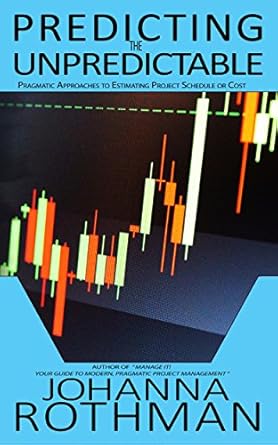# Johanna Rothman - Predicting the Unpredictable (Highlights)

## Metadata
**Review**:: [readwise.io](https://readwise.io/bookreview/50621828)
**Source**:: #from/readwise #from/manual
**Zettel**:: #zettel/fleeting
**Status**:: #x
**Authors**:: [[Johanna Rothman]]
**Full Title**:: Predicting the Unpredictable
**Category**:: #books #readwise/books
**Category Icon**:: 📚
**Highlighted**:: [[2025-04-17]]
**Created**:: [[2025-04-19]]
## Highlights
- Your estimate is a guess, a prediction. It is not fact. (Page 15) ^878584582
- We can timebox our learning. We can choose to stop doing something. We can put acceptance or release criteria around it and say, “We have done enough for now.” (Page 23) ^878584583
- If you eyeball the story and say, “Hmm, if we put everyone on the team on this story, and we think we can attack this story together and get it done in a day,” then the story is the right size. (Page 31) ^878584584
- If you have not worked on a project like this with this team, you have other problems. It’s not worth estimating the entire backlog at the beginning of the project, because the team members have no idea what relative estimation means to anyone else on the team. (Page 34) ^878584585
- The team tracks its velocity for three iterations and re-estimates the entire backlog again. The team can re-estimate and compare what it now knows with what it knew before. (Page 35) ^878584586
- If the manager has decreed the date and the feature set why are you estimating anything? Get to work! (Page 37) ^878584587
- If you have a ranked backlog, and you finish features, you can always stop the project if you hit a particular date or cost. (Page 38) ^878584588